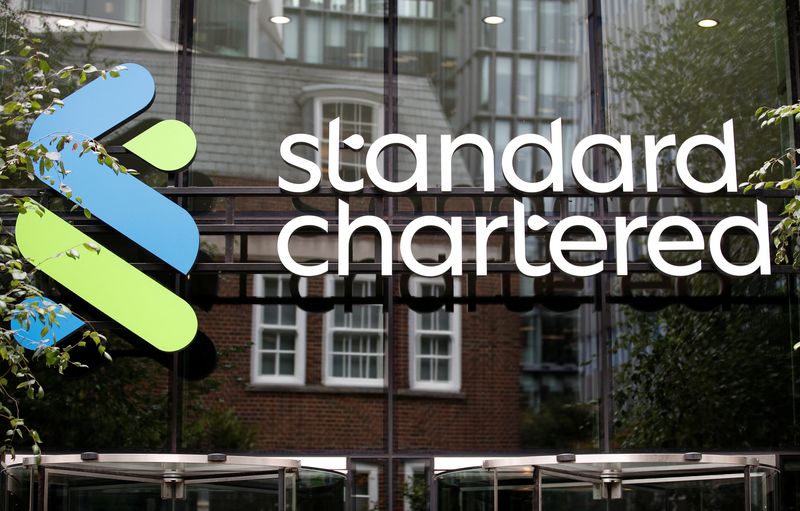By Selena Li and Lawrence White
HONG KONG/LONDON (Reuters) -Standard Chartered said it will double investment in its wealth unit while paring back retail banking, as it lifted performance targets and said it will go further in reshaping the bank to try and meet those goals.
Income this year will grow by around 10%, the bank said on Wednesday, up from a previous estimate of towards 7%. The lender also said it plans to return at least $8 billion to shareholders over 2024-2026, up from $5 billion.
StanChart, like rival HSBC, is restructuring its business to focus more on affluent individual customers and international companies that are likely to yield more in fees for the bank.
It said it will double spending on its wealth business, investing $1.5 billion over five years in relationship managers and investment advisers.
That will be funded by cutting more of its mass retail business, following the example of HSBC that has greatly reduced its retail banking operations in Western markets.
StanChart's shares rose by 2.7% in London after the results, as it joined European peers in making robust progress on sustaining profits even as rates fall.
The lender's shares have soared 35% this year, outpacing HSBC which has risen 15%.
StanChart said it is exploring the opportunity to sell "all or part of a small number of businesses" that no longer make strategic sense.
"This will be a plan unfolding over 18-24 months so there are no set decisions taken yet," Diego De Giorgi, group chief financial officer, told Reuters when asked which markets the bank might scale back in.
The lender said its third quarter pretax profit was $1.72 billion, above an average analyst forecast of $1.49 billion and more than double the year earlier number of $633 million when it took a nearly $1 billion hit from its exposure to China.
It did not announce a share buyback for the quarter, unlike HSBC.
DOUBLING DOWN ON WEALTH BUSINESS
Income from StanChart's wealth solutions unit jumped 32% to $694 million, the highest growth rate among its main businesses.
The lender has been selectively exiting wealth markets that do not fall within its strategy. In India, it is offloading its personal loan business to local peer Kotak Mahindra Bank.
An analyst says the lender's move to pare its retail market presence echoes its peers.
"Whereas HSBC and Citibank have exited retail banking in many markets where they don’t focus on high-end premier and wealth management, Standard Chartered (OTC:SCBFF) still has retail businesses in places like Korea whose positioning is unclear, given that it lacks scale," Michael Makdad, senior equity analyst at Morningstar, told Reuters.
StanChart's strategy for Korea will exemplify what it is doing across its businesses, De Giorgi told Reuters, namely focusing on its Wealth business and using its retail bank as a pipeline for customers on their way to becoming wealthy.
Its global markets business reported 16% growth - the second largest growth across main businesses - in the July-September period from a year ago, to $840 million.
The London-headquartered bank, which has struggled to compete with Wall Street and European rivals on large deals, has in recent months launched a reorganisation in corporate and investment bank (CIB) to boost competitiveness.

"In our CIB business, we are taking actions to focus on larger global clients who rely on our unique cross-border capabilities," Winters said.
StanChart created a banking team within its CIB division last month aimed at boosting cross-border business, Reuters has reported. The bank also folded its industries coverage team into its dedicated mergers and acquisitions advisory team in August.